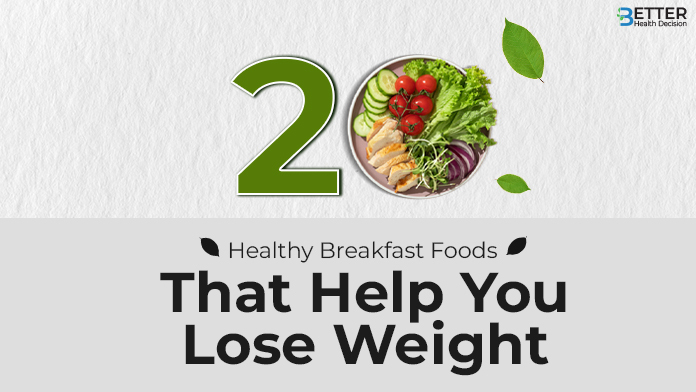Breakfast is lauded as the most important meal of the day, and for good reason. A balanced and nutritious breakfast jump starts your day on a good note by enhancing your metabolism and energy levels. A good, healthy meal in the morning also stabilises your blood sugar levels and curbs cravings, keeping you full and energetic throughout the day. Choosing nutrient-dense, protein-rich, and fiber-filled foods can significantly impact your health if you aim to shed an extra pound to lose weight or stay healthy. Proper breakfast helps promote satiety, prevent overeating and provide essential minerals and nutrients to fuel your body.
An appropriate and nutritious meal at the start of the day gives a kick to your daily routine and can enhance fat-burning, muscle retention, and overall health. Opting for whole, unprocessed food such as lean proteins, healthy fats, and complex carbohydrates enhances digestion and sustains energy levels. Whether you prefer a hearty meal or a light breakfast, having the right ingredients on your plate can make a huge impact on your overall health and offer a long-term weight loss plan. Here are
20 healthy breakfast foods to help you start your day more positively while staying energised the whole day.
1-Oatmeal
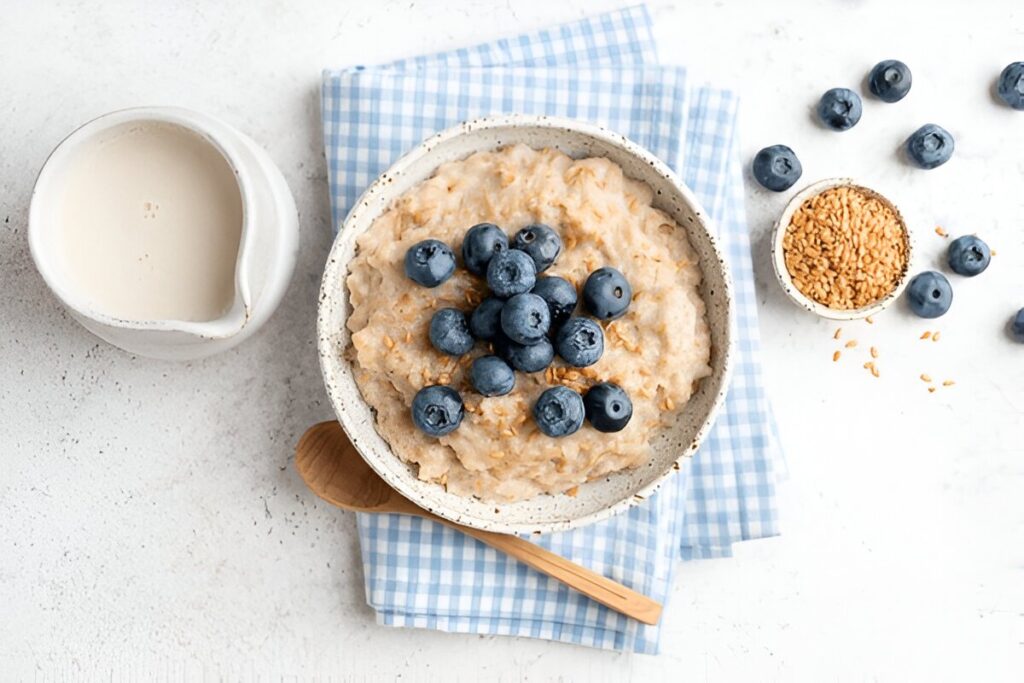
Oatmeal is made from rolled or steel-cut oats enriched with essential nutrients. It contains beta-glucan, a soluble fibre enriched with antioxidant and prebiotic properties that can lower cholesterol and sugar levels. How our body processes oats promotes satiety, reducing the temptation of mid-morning snacking.
Oats also provide essential nutrients like
- B vitamins: Improves energy levels and brain functionality.
- Iron: Improves oxygen transportation in the body.
- Manganese: Improves metabolism and bone health.
- Magnesium: Enhance muscle and nerve functioning.
- Zinc: Enhances digestion and immunity.
- Selenium: An antioxidant that protects cells from damage.
Oats also contain approximately 10 grams of protein per cup(81g) of dry oats. Make oats with milk instead of water or pair them with eggs to enhance protein content.
For variety, oats can be mixed with dried fruits, nuts, seeds, and coconut to create a homemade muesli.
Oats are also a good option for individuals who are suffering from celiac disease or gluten sensitivity. However, due to the risk of cross-contamination, it is best to choose certified gluten-free oats.
2. Greek Yogurt
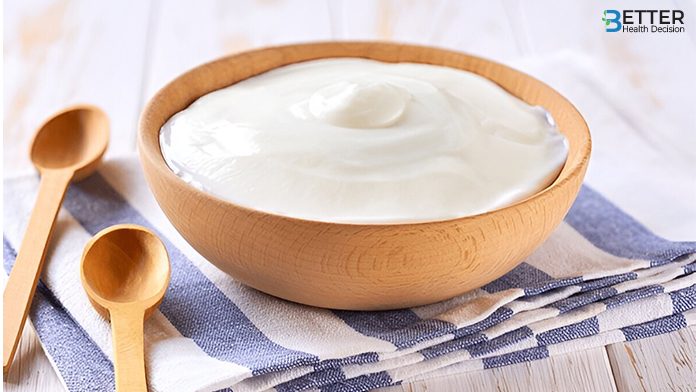
Greek Yogurt is a dairy product made by straining whey and other liquid from milk curds, producing a protein-rich creamy product that supports muscle health, aids in weight loss, and keeps you full for longer. Enriched with probiotics, it promotes a healthy gut by aiding digestion and promoting beneficial gut bacteria.
It is also a good calcium source for strong and healthy bones and teeth. Yogurt includes:
- Calcium
- Vitamins
- Phosphorous
- Potassium
- Zinc
- Magnesium
- Vitamin B12
Flavor yogurt with fresh berries, honey, nuts, and seeds to enhance flavor.
Greek Yogurt is versatile and can be used with various foods in a balanced diet. It can be enjoyed as a smoothie or a creamy base for multiple dishes, adding texture and taste.
3. Eggs

Protein and Satiety
- Eggs are a rich source of protein, essential for muscle growth and maintenance, and they promote overall health while supporting weight loss.
- A study held in 2020 shows that eating eggs for breakfast keeps you full for longer and reduces overall calorie intake by lowering unnecessary cravings compared to those who have bran cereal with milk and orange juice.
Nutrient-Dense
- Eggs are enriched with essential minerals and vitamins A and B and contain iron and calcium.
- Eggs also contain antioxidants like lutein and zeaxanthin, crucial in maintaining eyesight and promoting cardiovascular health. Choline is another key nutrient in the egg that supports brain and liver function.
Heart Health
- Despite having high cholesterol content, researchers have shown that eggs do not directly raise cholesterol for most people.
- Some studies have shown that eggs may offer a mild protective effect against heart disease.
Pair eggs with whole grains, vegetables, or fruit for a nutritious and balanced meal.
4. Chia Seeds

Chia seeds are a nutrient-dense superfood rich in fiber, protein, and heart-healthy omega-3 fatty acids. Just two tablespoons provide nearly 10 grams of fiber, which supports digestion, promotes gut health, aids in weight loss, and helps regulate appetite by increasing feelings of fullness. The soluble fiber in chia seeds absorbs water, expanding in the digestive tract and prolonging satiety.
The nutrients in chia seeds have other benefits also, including:
- Lowering cholesterol
- Reducing inflammation
- Managing glucose levels
Chia seeds are not rich in protein, but pairing them with cottage cheese, yogurt, or any protein shake can enhance overall protein intake.
You can make a healthy and delicious recipe by mixing almond milk, letting it rest overnight, and enjoying a creamy chia pudding. You can add honey, vanilla extract, or fresh fruits to enhance its flavor.
5. Berries

Berries are rich fiber sources, packed with antioxidant properties, and are naturally sweet, low-calorie treats. Popular berries include
- Blueberries
- Strawberries
- Blackberries
These berries are rich in anthocyanins, antioxidants responsible for their blue, purple, and red colour.
A diet high in anthocyanins may help protect against inflammation, heart disease, cancer, type 2 diabetes, and other chronic conditions.
In addition to their health benefits, berries support digestion, promote fat loss, aid in weight loss, and reduce inflammation. Berries are a versatile and nutritious addition to meals—try adding them to Greek yogurt, cottage cheese, oatmeal, chia pudding, or smoothies for a delicious and refreshing boost.
6. Whole-grain toast With Avocado
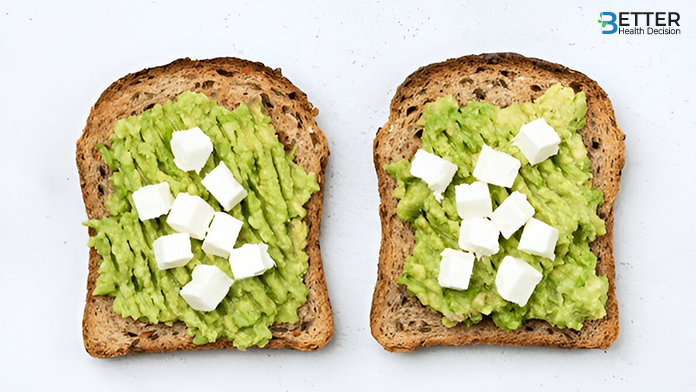
Whole-grain bread is enriched with high fiber content and is an excellent source of complex carbohydrates that promote digestion, support weight loss, and provide energy throughout the day. Additionally, avocado is enriched with monounsaturated fats, which help better absorb fat-soluble vitamins and promote satiety.
Whole grain and Avocado together provide a balanced meal that energises you throughout the day. Some benefits are :
- Rich In Fibre: improves digestion by enhancing gut health.
- Filled With Healthy Fats: improves cognitive health and brain sharpness.
- Loaded With Nutrients: Provides potassium, vitamin E, and antioxidants.
7. Cottage Cheese
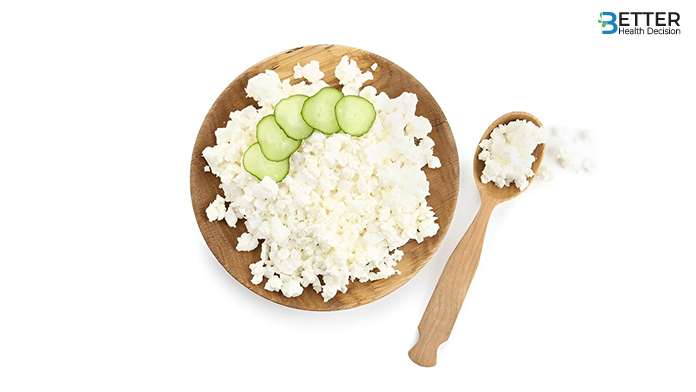
Cottage cheese is a protein-packed, low-calorie superfood and provides 24g of protein per cup (220g), making it equivalent to eggs. It contains conjugated linoleic acid (CLA), which is linked to fat loss, weight loss, and improved body composition. Rich in calcium, B vitamins, phosphorus, and selenium, it supports bone health, weight loss, and overall well-being. Cottage cheese is enriched with casein protein, which helps in aiding muscle repair, while probiotics promote gut health. With only 180 calories per cup, it promotes long-term weight management. You can mix cottage cheese with berries, salads, tomatoes, cucumbers, flax seeds, or granola.
Enjoy it with berries, peaches, tomatoes, cucumbers, chia seeds, flaxseeds, or granola.
Additional Benefits:
- High In Casein Protein: Slow-digesting protein helps build and repair muscles.
- Low In Calories But Filling: Keeps you full for longer, curbs unnecessary cravings aiding in weight management.
- Rich In Essential Nutrients: Contains B vitamins, phosphorus, and selenium for overall well-being.
8. Smoothies
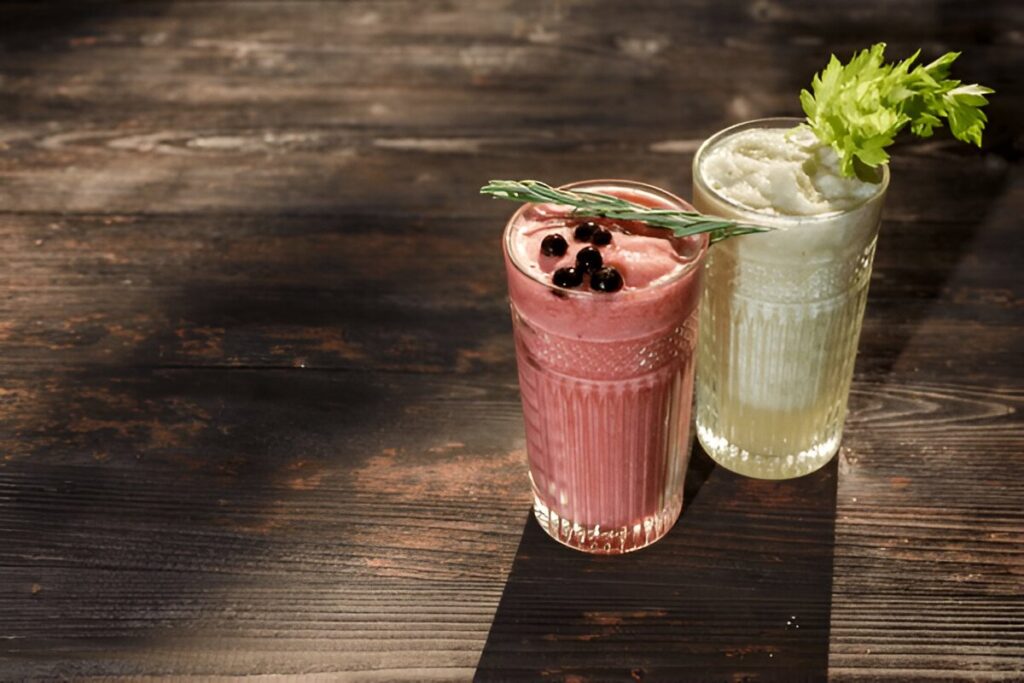
- Nutrient-Dense – Packed with vitamins, minerals, and antioxidants from fruits, vegetables, and superfoods.
- High in Fiber – Supports digestion and keeps you full longer when made with ingredients like chia seeds, flaxseeds, or oats.
- Protein-Powered – Boosts muscle recovery and satiety when blended with Greek yogurt, protein powder, or nut butter.
- Hydrating & Refreshing – Contains water-rich ingredients like coconut water, cucumber, and watermelon for hydration.
- Customizable & Convenient – Quick to prepare and easy to modify with different flavours and nutrients.
- A homemade smoothie can be an excellent breakfast choice with nutrient-dense ingredients like spinach, berries, protein powder, and almond milk, supporting weight loss and overall health.
9. Nuts

- Rich in Healthy Fats – Contains heart-healthy monounsaturated fats that support cardiovascular health.
- High in Protein & Fiber – Promote satiety, aiding in weight management and digestive health.
- Loaded with minerals : Magnesium, and potassium, they are necessary for maintaining function and overall well-being.
- Powerful Antioxidants – Contain vitamin E and polyphenols, which help protect cells from damage.
- Heart-Healthy – A 2022 review found that daily nut consumption may reduce the risk of cardiovascular disease.
10. Flaxseeds
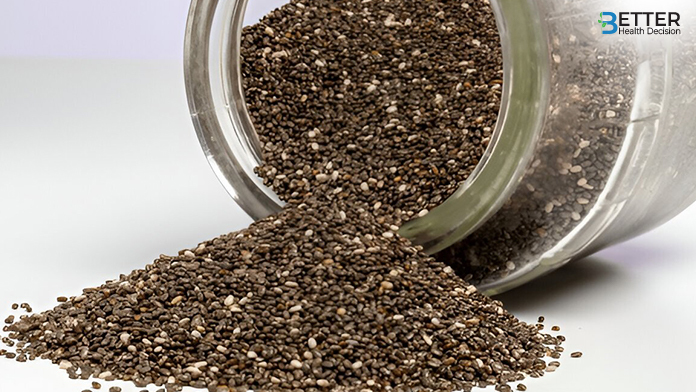
| Nutrients | Health Benefits | How To Use |
| Omega 3 fatty acids | support heart health and reduce inflammation | Add to a smoothie or yoghurt oatmeal. |
| High-fibre | Aids digestion promotes fullness | Sprinkle on cereal or mix into baked goods. |
| Plant-Based Protein | Helps with muscle maintenance and safety | Blend into protein shakes or energy bars. |
| Lignans | Lower cholesterol and promote heart health | Stir into cottage or nut butter |
| Blood Sugar Regulation | Stabilise blood sugar levels | Mix with chia seeds |
11. Green Tea

Green tea is a herbal, refreshing drink with a gentle energy boost that kick starts your morning. It contains half of the caffeine in coffee, making it a good option for those who want to reduce their caffeine intake.
It also contains L-theanine, an amino acid that promotes relaxation and helps counteract the “jitters” often associated with caffeine, improving mood and reducing anxiety.
Green tea is rich in epigallocatechin gallate (EGCG), a powerful antioxidant that protects against neurological disorders like dementia by reducing cell damage and inflammation.
While not a food, green tea is a powerful metabolism booster that supports weight loss. It contains catechins, which help increase fat burning.
12. Peanut Butter
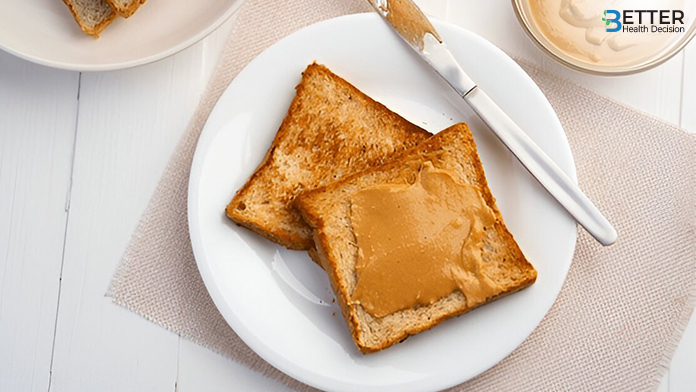
| Nutrients | Health Benefits |
| High In Proteins | Promotes muscle maintenance and keeps you full for longer |
| Heart-Healthy Fats | Contain monosaturated and polyunsaturated fat, enhancing cardiovascular health. |
| Rich In Fibre | Aids digestion and regulates blood sugar levels. |
| Essential Nutrients | Magnesium, Vitamin E, and Potassium |
| Energy Boosting | Keeps you active in the morning |
13. Quinoa

Quinoa is highly nutritious and a versatile breakfast filled with proteins, fibre, minerals, and vitamins. It is rich in protein and contains all nine essential amino acids that help repair muscle, promote overall health, and support weight loss. It is a tiny seed but not a grain that promotes gut health by aiding digestion. Quinoa is a rich source of iron and magnesium, filled with antioxidant properties, and keeps you energetic throughout the day.
14. Bananas

- Rich in Resistant Starch – Slows digestion, promotes fullness, and supports fat burning.
- Natural Energy Booster – Provides quick and sustained energy due to its natural sugars and Fibre.
- Supports Digestion – High in Fibre, aiding gut health and preventing constipation.
- Packed with Essential Nutrients – Contains potassium, vitamin C, and vitamin B6 for overall well-being.
- Heart-Healthy – Helps regulate blood pressure and supports cardiovascular health.
15. Dark Chocolate

Dark chocolate is an antioxidant enriched with fibre, magnesium and zinc, making it a delicious and nutritious breakfast. Filled with flavonoids, dark chocolate helps improve blood circulation and reduce inflammation, and the presence of neural compounds in it enhances your mood and cognitive function by increasing serotonin and endorphin levels.
Eating dark chocolate in the morning improves the burn-fat process, supports weight loss, and enables you to manage your weight.
16. Spinach And Other Leafy Greens
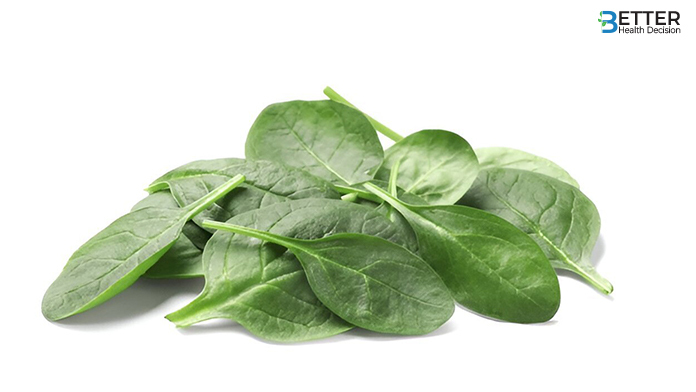
| Nutrients | Health Benefits | Health Benefits |
| Rich in vitamins, | It provides vitamins A, C, K, and folate for better immunity and overall health | Add to smoothies or omelettes |
| High in Fibre | Improves digestion, promotes gut health and satiety | Mix breakfast wraps or sandwiches. |
| Antioxidants | reduce inflammation and protect cells from damage | Stir into scrambled eggs |
| Heart Health | Contains nitrates that regulate blood pressure and improve circulation | Toss into avocado toast or grain bowls |
| Brain Boosting | Enhance cognitive health and memory | Blend into a smoothie |
Leafy greens are low in calories but rich in Fibre and essential minerals and nutrients, which enhance metabolism and provide sustained energy levels.
17. Cottage Cheese With Pineapple
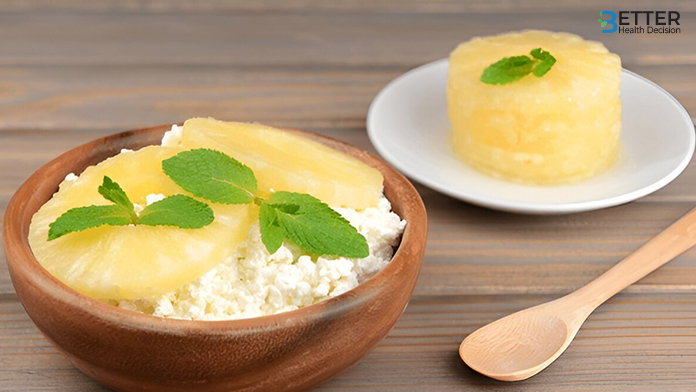
- High in Protein – Cottage cheese is a rich source of casein protein, which promotes muscle maintenance and keeps you full longer.
- Supports Digestion – Contains probiotics that promote gut health, while pineapple’s Fibre aids digestion.
- Boosts Immunity – Pineapple is packed with vitamin C and antioxidants that strengthen the immune system.
- Aids in Weight Management – Low in calories but high in protein and Fibre, helping control appetite and support fat loss.
- Rich in Essential Nutrients – Provides calcium for bone health and bromelain from pineapple, which may help reduce inflammation.
18. Tofu Scramble
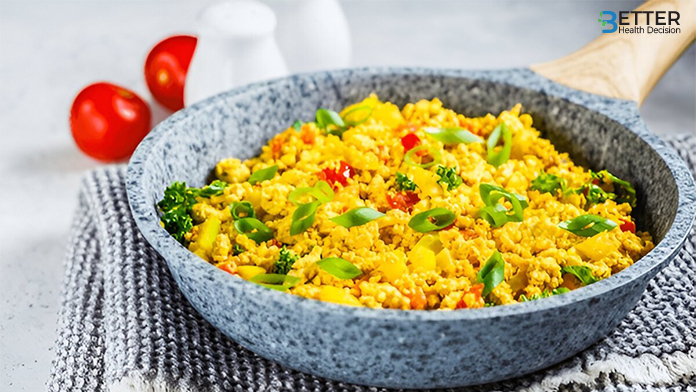
Tofu scramble is one of the best alternatives for a healthy breakfast filled with protein and plant-based ingredients, making it one of the best options even for vegans and vegetarians. Enriched with all the nine essential amino acids, tofu promotes muscle maintenance and enhances overall health.
Tofu is filled with calcium, iron and magnesium, providing energy throughout the day, helping strengthen bones and supporting weight loss management. Isoflavon, a plant compound in tofu, helps balance hormones and enhances heart health.
19. Protein Pancakes
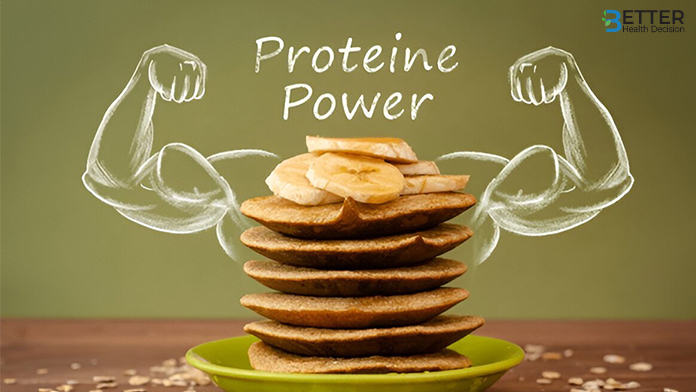
| Nutrient | Health Benefits | How To Use |
| Rich In Protein | Supports muscle growth, repair, and satiety | Use protein powder, eggs, or Greek yogurt in the batter |
| Energy Booster | Provide sustained energy | Healthy fats support heart health |
| Enriched With Essential Nutrients | Contains vitamins, iron, and calcium | Add to almond flour or nuts. |
| Heart Healthy Fats | Healthy fats support heart health | Cook with coconut oil or top with nuts. |
20. Fruits

- Boosts Immunity – Citrus fruits, berries, and papayas are rich in vitamin C and antioxidants that help strengthen the immune system.
- Supports Digestion – Fiber-rich fruits like apples, pears, and bananas promote gut health and prevent constipation.
- Enhances Energy Levels – Natural sugars in fruits provide a quick and steady energy source without spikes in blood sugar.
- Promotes Heart Health – Fruits like avocados, pomegranates, and grapes contain heart-healthy compounds that support cardiovascular function.
- Aids In Weight Management – Low in calories and high in Fibre, fruits keep you hydrated and nourish your body.
Conclusion
Choosing a healthy, nutritious, tasty breakfast can be challenging. We have provided you with the 20 most easy and healthy breakfast options to help you keep energised and active throughout the day, promoting satiety, supporting weight loss, and nourishing your body with essential minerals and nutrients. With this breakfast, keep yourself hydrated and active through regular physical activity.
Start your day with nutrient-rich, satisfying foods, and experience the positive impact on your energy, focus, weight loss, and overall health!
Some Frequently Asked Questions About Healthy Breakfast
1- Why is breakfast considered an essential meal of the day?
Breakfast is as it kickstarts metabolism, replenishes energy levels and provides vital nutrients for optimal brain and body function. A well-balanced breakfast also helps maintain steady blood sugar levels, supports weight loss, and keeps you full, reducing unhealthy cravings throughout the day.
2 – What are the key benefits of a healthy breakfast?
A healthy breakfast enhances your energy levels and promotes stable blood glucose levels, especially for insulin-sensitive individuals, while providing essential nutrients to the body. Including fibre-rich fruits, grains, and vegetables in your breakfast improves digestion and supports weight loss.
3 – Are there any side effects of skipping breakfast?
Skipping breakfast can lower your energy levels, impact your mental health as well and lead to unnecessary, unhealthy cravings resulting in weight gain. It may disrupt your metabolism, affect blood sugar levels and contribute to digestive issues over time.
4 – Is there any right time to eat breakfast?
The best time to eat breakfast is within 1-2 hours of waking up to kickstart metabolism, support weight loss, and maintain stable energy levels. Eating between 6:30 AM and 9:00 AM helps regulate blood sugar and supports overall daily digestion and focus.
5 – What is a healthy breakfast?
A healthy breakfast is filled with nutrients that provide energy to your body, support metabolism, and help in weight loss management by keeping you full for longer. A healthy breakfast should include fats, fibres, proteins, and vitamins from fruits, eggs, whole grains, or dairy.

